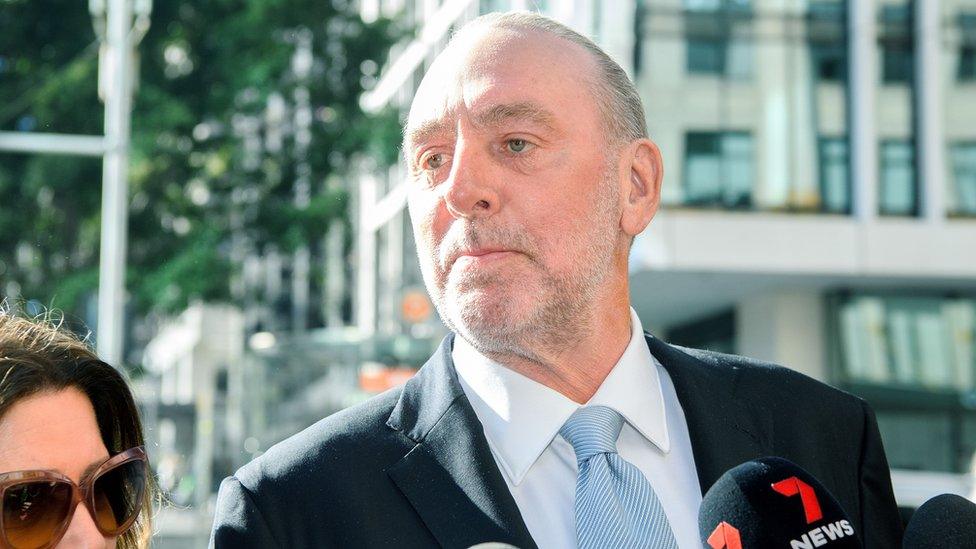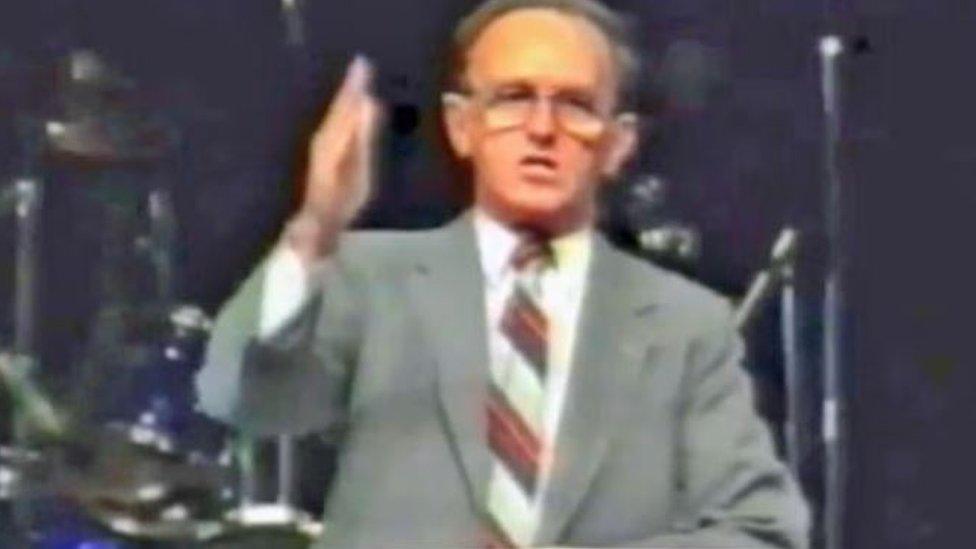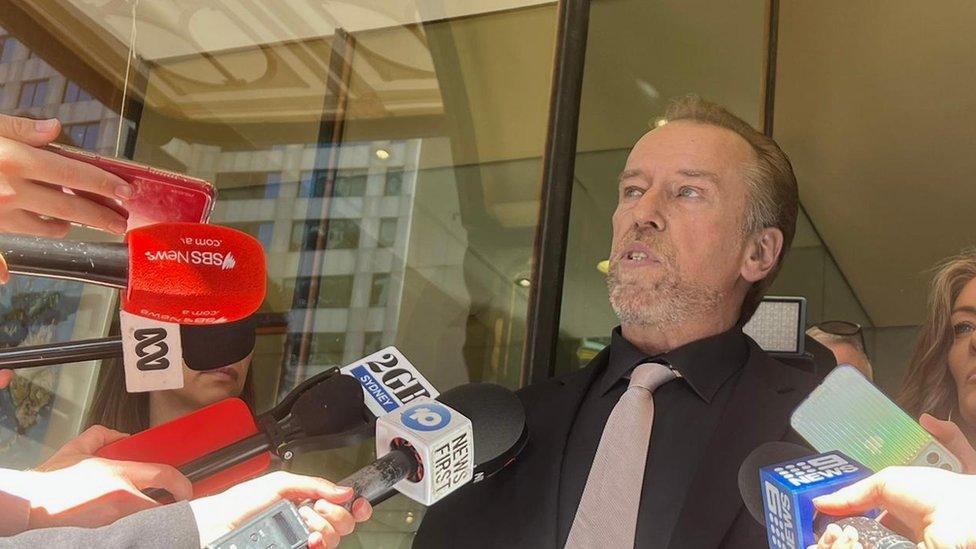Brian Houston: Hillsong Church founder cleared of concealing father's abuse
- Published

Brian Houston speaks to reporters outside court on Thursday
Hillsong Church founder Brian Houston has been found not guilty of concealing the crimes of his paedophile father.
Australian prosecutors had argued Brian Houston tried to cover up his father's sexual abuse of a child in the 1970s.
The church founder only learned of the abuse decades later and said he did not report it because the victim, by then an adult, did not want police involved.
Frank Houston, who died in 2004, is believed to have used his position as a pastor to abuse as many as nine boys.
Victim Brett Sengstock - who has waived his right to anonymity - was seven when his family hosted the New Zealand preacher at their home while he was on a tour in Sydney.
It was then that Frank Houston sexually abused him for the first time - abuse which continued over several years when the pastor moved to Australia.
Prosecutors had contended Brian Houston was involved in "hush money" paid to Mr Sengstock some years later, and that he wielded his powerful influence to further cover up abuse allegations.
They argued that his "only focus" in responding to the claim was to protect the Church - that the victim did not want police involved was a convenient excuse for failing to report them.
But on Thursday, Magistrate Gareth Christofi ruled that Mr Houston had a "reasonable excuse" under the law not to do so.
"I do not see any reason why a convenient excuse may not also be a reasonable one," he said.
Speaking outside court on Thursday, Mr Houston called his father a "serial paedophile" and admitted the extent of his crimes will likely never be known.
"But I am not my father. I did not commit this offence," the 69-year-old said.
Founded by Brian Houston in Sydney 40 years ago, Hillsong has become a global megachurch known for a brand of modern evangelism that has attracted millions of followers.
It also made Mr Houston one of the world's most famous preachers. He remained the Church's global senior pastor until 2022 when he resigned following allegations he behaved inappropriately towards two women.
The verdict is the culmination of over a decade of speculation about a "cover-up" by the Church, and the end of a court battle which has unearthed at-times extraordinary evidence.
'I was paid for silence'
Brian Houston has previously described the moment his father - his "hero" - confessed he had sexually abused a boy as like "jets flying into the twin towers of my soul".
At that time in late 1999, Frank was revered - considered a founding father of the Pentecostal movement in Australia - and Brian himself was on a meteoric trajectory.
Not only did he lead his own congregation - the seed of megachurch Hillsong - Brian led the entire denomination it fell under; then called the Assemblies of God (AOG).

Frank Houston was revered by many Christians
The Sydney court heard evidence that Frank Houston's victim was daunted by the prospect of speaking up about such a powerful family, and felt pressured by both his relatives and the church to keep quiet.
In some of the court case's most shocking evidence, Mr Sengstock detailed meeting Frank Houston at a suburban McDonald's restaurant in late 1999. It was there that the 61-year-old said he was pushed to sign a scrunched-up napkin in exchange for A$10,000 (£5,000; $6,400).
It is unclear what - if anything - was written on the paper, but Mr Sengstock said: "I was paid for my silence".
Mr Houston told the court he knew about the money. He consulted a lawyer over the matter and passed that advice on to his family, he said, before asking them to keep him at "arm's length" from it.
Prosecutors argued Mr Houston knew it was "hush money", but he told the court he saw it as his father's "feeble attempt to try and right the wrong".
Brian's next steps also came under scrutiny in court.
At an emergency meeting in the Qantas lounge at Sydney airport, he told the AOG board of Frank's confession.
Brian said he had immediately sacked his father and that the victim had repeatedly stressed that he did not want police involved - something Mr Sengstock told the court he can't remember ever telling Brian.
The group discussed - then accepted - legal advice which said they did not need to make a report because the victim was an adult, according to minutes of their meeting tendered in court.
And ultimately, they decided that Frank would be invited to enter its "restoration program", refrain from preaching for 12 months and be offered counselling.
The meeting log was then sealed, Frank's "retirement" was announced in internal messages, and he was paid a package to leave Hillsong.
While Brian conceded the AOG church could have been more forthright about why Frank was standing down, he said he stood by the decision not to report the allegation to police.
"I believe we did the right thing, that I personally did the right thing," he told the court.
More allegations
Within a year of the meeting in 1999, Brian had learned of more allegations his father had abused several other boys in New Zealand.
However, as more victims came out of the woodwork, Brian still did not go to police. He told the court he didn't think Frank was a danger to the community because he was 82 and the offending was historic.
But his legal team say he spoke openly about Frank's offending.
They pointed to sermons Brian had given where he told thousands of churchgoers about the "predatory", "very serious moral accusations" made against Frank, and a letter sent to AOG pastors in 2001 using similar language.
Prosecutors had argued Mr Houston had downplayed the seriousness of the allegations, and the court heard from a pastor who had welcomed Frank to the pulpit in the months before his death - something he says he never would have allowed had he realised what the preacher was accused of.
But ultimately Mr Christofi ruled the prosecution case was too "weak".
He found that while it was "quite clearly wrong" for Mr Houston to be involved in the payment of money to Mr Sengstock, there appeared to be no need to buy his silence.
Whether his reluctance to report aligned with Brian's own personal interest was not relevant, he said.
And proving allegations of a further cover-up was "a tall order".
Brian did not dismiss the allegation, he had acted quickly, and while "euphemistic at times" he had made it clear he wanted people to know what his father had done.
"That is the very opposite of a cover-up," Mr Christofi said.
After the verdict, Mr Houston called the case against him a "targeted attack".
"If I wasn't Brian Houston from Hillsong this charge would never have been laid."
His feelings of relief were mixed with grief for his father's victims, he said.
"A lot of people's lives have been, tragically, hurt and for that I'll always be very sad."

Mr Sengstock speaks to reporters
Flat too, was Mr Sengstock. Outside court he told reporters he felt the case had exposed how other people had taken it upon themselves to speak for him.
"Clergy child sexual abuse survivors… still do not have a voice in this country."
He said he'd suffered 45 years of trauma both from the abuse and the response by the Church.
"Regardless of today's outcome, I have received a life sentence."